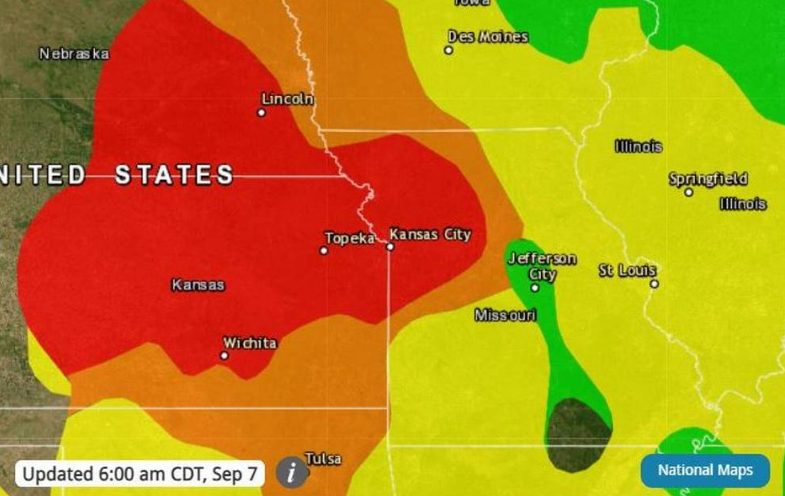On Sept. 7, the smoke from Canada wildfires had started to blow towards Topeka, Kansas causing an unsafe air quality warning for several days.
According to the CBS News, “The fires have scorched at least 11 million hectares – or over 27.1 million acres — of land across Canada this year. In June, the acreage burned this year surpassed the amount of land burned in 1989, which previously held Canada’s annual record.”
Because of this worsened air quality and the haze from these fires, people with respiratory issues, such as asthma, and student athletes, were encouraged to stay inside as best as possible.
“Those students that have asthma, even though the air quality may seem fine to those that don’t have breathing problems, they will start to feel it sooner,” said Jessica Gremmel, lecturer of allied health. “But then as it gets worse, it’ll start to affect everybody, all the people outside, all student athletes outside or even just walking from class.”
While it may be difficult to stop all activity outside for most students, they should limit the activity, drink lots of water and take frequent breaks.
If the air quality continues to worsen, and precautions such as staying inside and not doing much activity outside, there could be some issues that could arise such as asthma-like symptoms.
“[Its] mainly going to irritate their upper airways, it could get a little deeper into some of their lungs. […]. Or, their throat, their upper airways,” said Rusty Taylor, program director of Respiratory Therapy. “The particle sizes are a little bit larger than what we normally would breathe in deeply. If people have pre existing issues, like asthma, then they should probably try to avoid going out when it’s really hazy.”
While the air quality changes, it is encouraged by professionals to make sure any symptoms are kept track of and looked at by a doctor if they continue to be an issue.
“Respiratory symptoms, sinus symptoms continuing chronic cough. Change in what you’re coughing up. If you’re coughing up things, […] if it’s a change for you, and it goes on for several weeks it would be time to go see a physician,” Gremmel said.
For continuous updates on the air quality, go to AirNow.gov.
Edited by Aja Carter and Larissa Morgan









